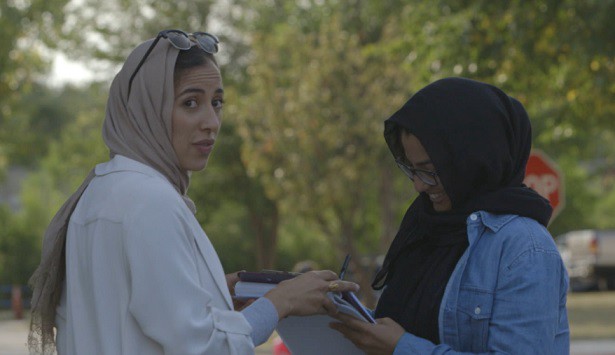Assia Boundaoui is an Algerian-American journalist and filmmaker based in Chicago. She has reported for BBC, NPR, Al Jazeera, VICE, and CNN and was the recipient of a first place Mark of Excellence Award from the Society of Professional Journalists for her reporting in Yemen. She directed a short film on hijabi hair salons for HBO’s “Lenny” docuseries that screened at Sundance in January.
“The Feeling of Being Watched” premiered at the 2018 Tribeca Film Festival on April 21 and will screen at Hot Docs later this month.
W&H: Describe the film for us in your own words.
AB: This personal film follows my journey investigating the FBI surveillance of my Muslim-American neighborhood outside of Chicago. In the process of trying to discover the truth about the government’s secret investigations, I confront the profound effects of growing up under the perpetual gaze of the government and the impact it has had on my family and community.
W&H: What drew you to this story?
AB: I grew up in a tight-knit Muslim-American neighborhood in the south suburbs of Chicago where we all suspected that the phones were tapped, that there were cameras posted on the street lamps, and FBI agents were staked out in cars around our mosque. When I left for college to become a journalist, I realized that the way I grew up was not normal; most American kids didn’t grow up thinking the government is always watching them.
Many of my childhood experiences and the stories I heard seemed paranoid, but I became determined to find out what is real and to get to the truth about why I’ve felt under surveillance my entire life.
The harm these terrorism investigations have had on my family and neighborhood is profound — more than a decade of being looked at with suspicion eventually impacts one’s sense of self. I still grapple with how American I actually feel. But somewhere in the gray dissonant border between the hyphens of my Muslim and Americanness, I have discovered that because I stand in between boundaries, I am uniquely positioned to observe.
I am making this film to challenge notions of how we see things, to disrupt status quos that have been petrified in particular angles, and to shatter conventional ways of seeing Muslims in America and create new ones.
W&H: What do you want people to think about when they are leaving the theater?
AB: “Wow, that was fucked up, but what a resilient family and community.”
In all seriousness, I hope the film influences a mainstream American audience’s emotional understanding of national security policies. I’d like it to create a shift in public attitudes that may contribute meaningfully to ending systems that allow the unwarranted surveillance and profiling of communities of color in America.
W&H: What was the biggest challenge in making the film?
AB: Getting people in my community to speak openly on camera about living under surveillance.
W&H: How did you get your film funded? Share some insights into how you got the film made.
AB: This film was five years in the making. Over that process we successfully funded the film with a mix of crowdfunding via Kickstarter and private donations, film grants (including Ford Foundation, Catapult, Chicken and Egg, TFI Gucci, IDA Enterprise, SFFILM, among others), private equity investment (Impact Partners), and pitching awards (HotDocs Forum, Points North, Sheffield MeetMarket, and IFP.)
It was a long hustle, but we made it happen in large part due to the brilliance of my producer Jessica Devaney.
W&H: What does it mean for you to have your film play at Tribeca Film Festival?
AB: It’s a dream to have my film make its world premiere at Tribeca and later have its international premiere at HotDocs! I feel like I’ve been making this film with my small team in a cave for the past five years, and we’re finally out in the light and ready to share it with the world.
I couldn’t think of a better place to bring this story and unique POV into the world than in New York at Tribeca.
W&H: What’s the best and worst advice you’ve received?
AB: Best advice: “Nothing good ever comes easy.”
Most terrible advice: “You’re so lucky to get funding. If I were you I’d just sign this contract without reading it.”
W&H: What advice do you have for other female directors?
AB: Know your value, always negotiate a salary up. Never believe them when they say it’s not possible.
W&H: Name your favorite woman-directed film and why.
AB: “The Gleaners and I” by Agnès Varda. The film moves and stirs something deep within me. Her childlike whimsy, imagination, deep empathy for the way people live their lives, and her piercing truth-telling about the ills of our society [all stand out.]
Hers is cinema weaved with such attention to detail and love for the process of creating. I love me some Agnès.
W&H: Hollywood and the global film industry are in the midst of undergoing a major transformation. Many women — and some men — in the industry in the industry are speaking publicly about their experiences being assaulted and harassed. What are your thoughts on the #TimesUp movement and the push for equality in the film business?
AB: It’s a long time coming. I am invigorated daily by the bravery of these women speaking up and busting the secrecy that has allowed these crimes to fester for so long [by] telling their stories without fear or shame. I am emboldened by their courage. This reckoning has been a hundred years coming, and I’m glad it’s finally here.







